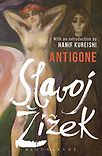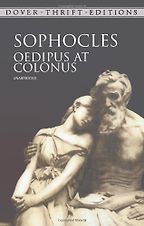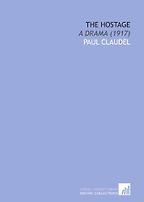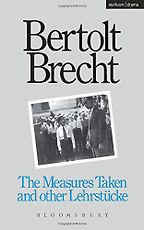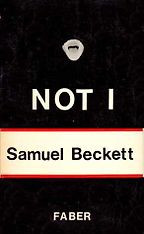Can you tell us a little bit about why you’ve chosen each of these plays?
At first, the five plays look like a jumbled heap lacking any common feature—what could they have in common? The bitter end of the old Oedipus who cannot reconcile himself with his fate; Richard II’s descent into madness after he is deprived of royal prerogatives; the meaningless self-sacrifice of a woman married to a man she despises; the ruthless killing of a young Communist who has shown too much compassion; and the confused mumbling of an old senile Irish woman?
To each of these plays, one can easily substitute another piece by the same author which deserves much more our attention. For example, is the ethical fidelity of Antigone not much easier to identify with than the vicissitudes of the old Oedipus? Are the doubts and procrastinations of Hamlet not infinitely more interesting than the endless narcissistic complaints of Richard II? Does the terrible burden imposed on the heroine of Claudel’s Annunciation of Marie not touch us much more directly than Sygne’s eccentric act in Hostage? How can the minimalist staging of the Stalinist meanders in Measure Taken even compare with the wealthy texture of Brecht’s Galileo? And, last but not least, does the sheer wit of Waiting for Godot not immediately eclipse the rather boring monologue of Not I?
You’ve given us reasons not to read these plays! Is there something that pulls them together? A theme, perhaps?
I clearly see a feature they all share: they all push our subjective experience to its extreme, they all enact what Lacan calls “subjective destitution.” In every play, the hero is pushed beyond a certain limit, out of the domain in which rules of normal human existence apply; he or she finds him or herself in what Lacan called “between-the-two-deaths”: dead while still alive. Oedipus is thrown out of human community, wandering around as an excremental/sacred outcast with no place in any polis—he has seen too much. Richard II is gradually deprived of his royal symbolic identity and authority, reduced to a point of madness with nothing to rely on. Sygne de Coufontaine first sacrifices everything for a higher, Catholic, cause, and is then forced to sacrifice this cause itself, so that she finds herself in an existential void.
In a homologous way, Brecht’s anonymous hero has to sacrifice sacrifice itself, to disappear and to accept the disappearance of his very disappearance. Last but not least, the speaking mouth in Beckett is directly deprived of personality and reduced to a “partial object,” something like the smile of the Cheshire Cat which survives the cat’s disappearance. The underlying premise of all five plays is that this extreme limit-position is not just a point of total annihilation or destruction but, simultaneously, the unique chance of a new beginning.
‘The chance of a new beginning’ is an interesting point. I’m not sure these plays are usually characterised as hopeful! Is there a strand of hope and possibility running through each one, then?
I am well aware that all five plays are usually perceived as dark, if not hopeless—how can one imagine a more desperate situation than that of their heroes? What I try to do is not to simply turn around their predicament and discern a hidden optimist reversal, but something more subtle, a minimal subjective change, a change of the hero’s innermost stance which, while not making the situation in any sense less desperate, executes a kind of transfiguration opening up a new space. Towards the end of Oedipus at Colonus, the blind hero calls for Theseus and tells him that it is time for him to give the gift he promised to Athens; filled with new strength, he stands up and walks, inviting for his children and Theseus to follow him—the play ends with a gift as a political gesture. At the end of Richard II, the hero finds unexpected solace in music, fully identifying himself with its rhythm. In The Hostage, after losing everything, even the justification of her loss, Sygne enacts her resistance with a weird tic of her face. A weird spirit of calm concludes The Measures Taken, the hero dies reconciled with his fate, tenderly embraced by his comrades. And even in Not I, what then happens in the final shift of the play is that the speaker accepts her trauma in its meaninglessness and thereby gets rid of the entire topic of sin and punishment; there is no longer despair in the Mouth’s voice, the standard Beckettian formula of persistence is asserted (“no matter. . . keep on”). Such moments continue to fascinate me, one finds them also in other works, say, at the end of Coetzee’s Disgrace. It seems to me they can all be described as religious conversions for those who remain total atheists.
Do you think all great writing has to have the potential for a (non-)religious conversion? The writing, in order to be good, has to be able to change the reader?
Yes, but this conversion is profoundly atheist—it is not a discovery of transcendence, but of the void obfuscated by the mirage of transcendence. The best definition of this conversion was provided by Shakespeare in his Midsummer Night’s Dream, act 5, scene 1, where Theseus says:
The lunatic, the lover and the poet
Are of imagination all compact:
One sees more devils than vast hell can hold,
That is, the madman: the lover, all as frantic,
Sees Helen’s beauty in a brow of Egypt:
The poet’s eye, in fine frenzy rolling,
Doth glance from heaven to earth, from earth to heaven;
And as imagination bodies forth
The forms of things unknown, the poet’s pen
Turns them to shapes and gives to airy nothing.
Shakespeare proposes here a triad: a madman who sees devils everywhere; a lover sees sublime beauty in an ordinary face; a poet who “gives to airy nothing a local habitation and a name.” In all three cases we have the gap between ordinary reality and a transcendent ethereal dimension… This happens in art, and this happens exemplarily at the end of all five plays I listed: at the end, each of its heroes finds a relief in assuming the void.
This sense of simultaneous relief and dread must be difficult to communicate to an audience. Have you seen any truly great productions of any of the plays you’ve listed and have any of them captured that sense of relief at the end?
Now comes the big surprise: I haven’t seen on stage any of my favourite five plays – with the exception of a totally irrelevant, bad staging of Brecht’s The Measures Taken in Berlin.
Why haven’t you seen any of your favourite plays?!
It’s not just the empirical fact that I am not aware of any great performances of these plays in the last decades (although I was told that, a decade or so ago, there was a good staging of Richard II with Mark Rylance at the Globe Theatre in London). I want to keep these plays free for my imagination – whenever I re-read them, I always try to imagine some key scene in cinematic terms.
“At the end, each of its heroes find a relief in assuming the void”
Dorothy Sayers wrote a wonderful essay on Aristotle’s Poetics as a theory of detective novel—since Aristotle didn’t have at his disposal detective fiction, he had to refer to minor theatre pieces. I claim the same goes for Sophocles: since he didn’t have at his disposal cinema, he had to deal with theatre in all its clumsiness. Can one imagine anything more cinematic than the scene of Oedipus’s death—in the midst of a fierce thunderstorm, the blind Oedipus walks towards the abyss, and then we pass to a flashback, the messenger reports: “We couldn’t see the man—he was gone—nowhere! And the king, alone, shielding his eyes, both hands spread out against his face as if some terrible wonder flashed before his eyes and he, he could not bear to look.”
Similarly, is the finale of Richard II not calling for a crazy psychedelic combination of reality and cartoons, with Richard turning into a gigantic clock? When, in Hostage, Sygne intercepts the bullet aimed at her worthless husband and then dies with an obscene tic on her face, can this scene work without a cinematic close-up? The same goes for The Measure Taken: the finale (the young comrade accepts his death) only works when the declamatory dialogue is contrasted by the young comrade’s subtle bodily signs of distress and uneasiness? And, to conclude, how can Beckett’s Not I work without a close-up of the gigantic lips as an autonomous partial object?
Do you also “protect” other pieces of art—like film adaptations of favourite novels and the like—so that your imaginative responses can remain unfettered by other people’s interpretations? Or is it only plays?
In a strange way, I am not protective in the same way about novels—I always want to see the cinema version of a novel that I love, if there is one, for a simple and stupidly naïve reason: I want to see how the people I’ve read about really look and act! Furthermore, I am always in search of a movie that is better than the novel it is based upon, which is quite often the case. For example, although I admire Russell Banks, I think Atom’s Egoyan’s cinema version of The Sweet Hereafter is much better than Banks’ novel. But what really interests me are those rare cases when both the novel and its cinema adaptation can be worse—how can this be? The cinema version of Doctorow’s Billy Bathgate is basically a failure, but an interesting one: a failure which nonetheless evokes in the viewer the spectre of the much better novel. However, when one then goes to read the novel on which the film is based, one is disappointed—this is not the novel the film evoked as the standard with regard to which it failed. The repetition — of a failed novel in the failed film — thus gives rise to a third, purely virtual, element, the better novel. The film does not repeat the novel on which it is based; rather, they both repeat the unrepeatable virtual x, the ‘true’ novel whose spectre is engendered in the passage from the actual novel to the film. This virtual point of reference, although unreal, is in a way more real than reality: it is the absolute point of reference of the failed real attempts.
“This virtual point of reference, although unreal, is in a way more real than reality”
There is another similar case, The Man in the High Castle, Philip K Dick’s alternative history classic from 1963. It takes place in 1962, fifteen years after an alternative ending to World War II, in which the war lasted until 1947, when the victorious Axis Powers—Imperial Japan and Nazi Germany — rule over the former United States. The novel features a “novel within the novel” which describes an alternate history within this alternate history wherein the Allies defeat the Axis… We can read this double reversal as a dark allegory of our own time in which, although Fascism was defeated in reality, it is more and more triumphing in fantasy.
However, such a reading neglects the fact that the alternate reality described in the novel-within-the-novel is not simply our reality but differs from it in many crucial details. If we follow Lacan’s claim that the ‘real’ as a rule appears in the guise of a fiction-within-a-fiction, we should thus conceive alternate reality—depicted in the novel—and our reality as two realities, two variations of reality, while the ‘Real’ is the fiction—the novel-within-the-novel, or, in the TV series version, the film-within-the-film—which is neither of the two realities; our reality is one of the alternate realities with reference to the Real of the truth-fiction.
Get the weekly Five Books newsletter
In order to understand our reality, we should first imagine the possible alternate realities, and then construct the ‘impossible real’ which serves as their secret point of reference, as their hard core. What we have here is a kind of Freudian version of phenomenological eidetic variation: in Husserl, we vary the empirical content of, say, a table in order to arrive at what unites all empirical variations, the absolutely necessary and invariable components that make a table what it is, the eidos of table; in psychoanalysis, one collects all variations in order to reconstruct their “absent centre,” a purely virtual (inexistent in reality) form negated (distorted, displaced, et cetera) in a specific way by every variation given in reality.
Just to go back to your reluctance to see performances of the plays you love, you have actually written a play—Antigone—but considering you tend to see things more filmically than theatrically, are there any obvious cinematic affinities with your version of Antigone you can tell us about?
I have no problem with eventually seeing my play being performed—for the simple reason that I don’t love it. It’s too much part of me, and it’s obscene for me to love oneself. The ideal version of my play would have been a weird impossible combination of minimalist theatre and big spectacular cinema, superficially akin to Olivier’s version of Henry V.
Most of the action would take place on an almost barren stage, with just some half-abstract objects (a large rock, a small bamboo forest…), and with all actors dressed in simple ordinary contemporary clothes (old jeans, faded T-shirts). There would just be some details strangely sticking out—say, Ismene’s mouth would be painted by an extremely strong and fluorescent red lipstick. In one of his reflections about the stage, Brecht ferociously opposed the idea that the background of the stage should render the impenetrable depth of the ‘All of Reality’ as the obscure ‘Origin of Things’ out of which everything we see and know appear as fragments. For Brecht, the background of a stage should ideally be empty, white, signalling that, behind what we see and experience, there is no secret ‘Origin’. This in no way implies that reality is transparent to us, that we know all; of course there are infinite blanks, but the point is that these blanks are just that, blanks, things we simply do not know, not a substantial “deeper” reality.
“I have no problem with eventually seeing my play being performed—for the simple reason that I don’t love it”
Furthermore, this minimalism should also affect the way actors perform their roles. I think Elfriede Jelinek’s advice to theatre writers is not only aesthetically correct, but has a deep ethical justification: “Characters on stage should be flat, like clothes in a fashion show: what you get should be no more than what you see. Psychological realism is repulsive, because it allows us to escape unpalatable reality by taking shelter in the ‘luxuriousness’ of personality, losing ourselves in the depth of individual character. The writer’s task is to block this manoeuvre, to chase us off to a point from which we can view the horror with a dispassionate eye.”
This is what I want: people reduced to their ideologico-political stance, no depth of the real person behind.
Only in a couple of passages, this minimalism should be interrupted by a mega-spectacular cinematic mise-en-scene. For example, the final minutes of the second version of the denouement, the desperate Antigone wandering around Thebes in ruin, should be done with thousands of extras, gigantic sets of the town and special effects of fire and destruction, all these epic shots combined with extreme close-ups of the details of Antigone’s face—trembling lips, et cetera. The final killings should also be done in a pseudo-authentic ancient surroundings, with old swords, etc.
The message of this contrast is clear: reality is flat, ‘realism’ is a kitschy dream.
You say you don’t love your play—because it’s somewhat tainted by being associated with yourself—and so I wonder why you wrote it? Why a play? Why now?
The reason I wrote it is a simple one: the topic haunted me for years, and I just wanted to get it out, to get rid of it. What lurked in the back of my mind was Glenn Gould recording of Mozart’s piano sonatas, sometimes characterized as “wilfully idiotic”: he recorded it to demonstrate how bad the sonatas are, how low they stand compared to Bach’s piano works. I had the same idea with Antigone: I wrote it to show how stupid and morally problematic the girl is.
“Reality is flat, ‘realism’ is a kitschy dream”
And why a play? The reason is again a simple and straight one: it’s easier to write, it’s just dialogue, there is no need for descriptive passages—brief stage indications suffice—plus there is no first person voice of the writer: only others talk, never me. I find terrifying the idea of disclosing my emotions in first person, there is something obscenely exhibitionist in it, not unlike masturbating in public. No decent person can recite his or her poetry in public. The only poetry I can tolerate is the minimalist one, with no overflow of emotions or experiences—think of someone like Paul Celan.
Plato’s reputation suffers because of his claim that poets should be thrown out of the city—a rather sensible advice, judging from the post-Yugoslav experience, where ethnic cleansing was prepared by poets’ dangerous dreams. True, Milosevic manipulated nationalist passions—but it was the poets who delivered him the stuff which lend itself to manipulation. They—the sincere poets, not the corrupted politicians—were at the origin of it all. To put it in a brutal way, behind every ethnic cleansing there is some poet.
“Behind every ethnic cleansing there is some poet”
And, last but not least, why now? It’s politics, of course. It would be very depressing to see the recent revival of the Left end up in another quagmire like the previous ones, in another missed opportunity. One can effectively say about the Left in the last decades that it never missed the opportunity to miss an opportunity, so it is very important to delineate the basic ethico-political choices this revival faces. That’s why I wrote in the introduction to my Antigone that it’s not a work of art but an ethico-political exercise.
Are the five plays you’ve selected also ‘ethico-political exercises’? Or are they about ‘never missing an opportunity to miss an opportunity’?
The five plays are precisely not about missing an opportunity, the ‘suicidal’ gesture with which they close is an authentic act—in contrast to Sophocles’s Antigone which, I think, is about a missed opportunity, and the point of my rewriting is to reintroduce into it the dimension of authentic act, with direct relevance to our contemporary predicament.
We live in times of pseudo-conflicts: Brexit[‘s] yes or no; in Turkey, military or Erdogan; in Eastern Europe, new Baltic-Polish-Ukrainian fundamentalists or Putin; in Syria, Assad or Isis…
“There is no worse choice, both choices are worse, to paraphrase Stalin”
In all these cases, although one might slightly prefer one side to the other, the ultimate stance should be the one of indifferences: there is no worse choice, both choices are worse, to paraphrase Stalin. And it is here, at this formal level, that I see the ethico-political relevance of my rewriting of Antigone. The conflict between Antigone and Creon is for me also a pseudo-conflict: the only way to resolve it is to change the terrain and introduce another dimension (the intervention of the Chorus in my version). Exactly the same thing is needed in today’s struggle for emancipation: to move beyond our pseudo-conflicts—liberal permissiveness versus religious fundamentalism, et cetera—and to draw the coordinates of the true conflict which is, to put it bluntly, today’s form of what once was called class struggle. Who will be today’s Chorus? Refugees? Unemployed? A Chorus that I have in mind already appeared in what I consider the theatrical event of the 20th century, the Chereau-Boulez staging of Wagner’s Ring in Bayreuth [1976-1980]. What remains on stage after the twilight is the human crowd silently observing the cataclysmic event, a crowd which is left staring into the spectators when the music ends. To quote Chereau:
The Redemption motif is a message delivered to the entire world, but like all pythonesses, the orchestra is unclear and there are several ways of interpreting its message… Doesn’t one hear it, shouldn’t one hear it, with mistrust and anxiety, a mistrust which would match the boundless hope which this humanity nurses and which has always been at stake, silently and invisibly, in the atrocious battles which have torn human beings apart throughout the Ring? The gods have lived, the values of their world must be reconstructed and reinvented. Men are there as if on the edge of a cliff—they listen, tensely, to the oracle which rumbles from the depths of the earth.
There is no guarantee of redemption here: redemption is merely given as possible. Everything rests on them, the anonymous Chorus, without any guarantee in God or any other figure of the big Other—it is up to them to act like the Holy Spirit, practicing agape, or political love, as Terry Eagleton proposed to translate this term.
Five Books aims to keep its book recommendations and interviews up to date. If you are the interviewee and would like to update your choice of books (or even just what you say about them) please email us at [email protected]
Five Books interviews are expensive to produce. If you've enjoyed this interview, please support us by donating a small amount.

